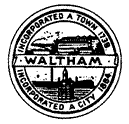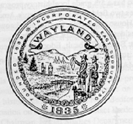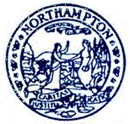


Community Connections Project:
The Massachusetts Studies Project has proposed a challenging
state-wide program of historical profiles of the Commonwealth
communities to be developed and posted online by students.
Teachers will be provided with the knowledge, skills
and materials to work with their students on project
implementation through the regional councils of the
Massachusetts Councils for the Social Studies. Teachers
will help to prepare lessons that link Massachusetts
communities to the standards mandated by the state
curriculum frameworks. Students will learn how to
research and select primary sources about their cities
and towns in Massachusetts to be included in a database
with supporting materials that can be used in the
classroom as well as by researchers online. The Bay
State Historical League will assist students with
hands-on opportunities to learn about their community
through local organizations. A
Power Point program with a draft profile of the
town of Wayland is included here as a sample for consideration.
The questions can be used by teachers to work up their
own lessons.
Potential basic research categories:
1) Settlement and incorporation of the town or city.
When was your town settled? How was it organized?
Was it an original town or part of another earlier
community?
2) Earliest settlement location (maps). What part
of your community was settled first? Why do you think
they chose this area? Find the location of your school
site on an early map. What was the original use of
the land? Compare to a recent map of your community.
3) Population changes. Who were the earliest people
and where did they come from? What is the attraction
of the community for newcomers? Compare numbers and
kinds of ethnic groups over time.
4) Schooling - yesterday and today: (Where was the
first school located? Find the oldest school still
standing in your community. Check for early school
records and evidence of curriculum.)
5) Historic landmarks and statues? Are there any
sites, buildings in the town that are on the Register
of Historic Places? If none, are there any the students
would nominate?
6) Important event? and important member of the community?
7) Landscape feature and use (pond, hill, river etc)
What feature(s) attracted the original settlers? Are
any natural resources used for municipal purposes
today? - i.e. water, gravel, etc. Related to business,
industry?
8) Work. Early industry in your community - Is it
still in existence? Where do community people work
today?
9) Transportation - yesterday and today. Early roads
and how traveled and main roads today.
10) Play. Earliest evidence of recreational activity
of young people. What opportunities for "fun" are
offered in the community today?
11) Relation to county and region. (Early and late
history, political organization, water supply, travel
routes etc.
Additional creative projects, including multi-media,
can supplement the basic data. A sample profile of
the town of Wayland in a draft stage of development
is included here as a sample for consideration. Please
email us if you
would like to become involved in this project or you
have ideas or activities on community studies you
are willing to share.
Resources: The
MSP website already has connections to your community,
and we are bringing these links together at the beginning
of the Community Connections Project. Whether or not
you join in on this pilot program, these resources
can be useful if you want to explore local studies
online and integrate this approach to your curriculum.
- Check out the text, Massachusetts
Places, A Local Studies Sourcebook for topics,
models, activities and projects by other schools
and groups, bibliography and more. (You can read
online or download.) The booklet also suggests appropriate
office holders and sources in the community to contact
for more detailed studies. (Students can interview.)
- The database has over 300 organizations with materials,
sites or programs on local history, heritage, and
watersheds. Go over the Local
History alphabetical list. On this search page
go to Organization type, and indicate Local Studies.
- State agencies have data. Check out the Mass
Government Homepage!
To find informatation about your community go to
"Commonwealth
Communities"
The 351 Mass. cities and towns can be searched alphabetically
by name or under their counties. Information on
tax and school budgets is included.
- Towns and cities have websites that usually have
URLs like the following Waltham's city website is
http://www.waltham-community.org/
and it links to related Waltham websites. Wayland's
website is http://www.wayland.ma.us/.Seals
like the ones above are often found on websites.
Check out your own.
- Community Birthdays provide occasions to celebrate
its history and current offerings. The 350th birthday
of Northampton
(see seal above) is in 2004 and preparations for
its celebration are underway. The theme for the
annual forum of the Mass. Historical Records Advisory
Board is Celebrating
History: Anniversaries to Educate, Promote and Preserve
History.
- A booklet "Historical Data on the Cities and Towns"
prepared by the Massachusetts
State Archives, Secy. of the Commonwealth is
not yet online but you can purchase a hard copy
from the New
England Historic and Genealogical Society. The
Citizen Information Service does have a listing
online of the Unincorporated
and Unofficial Names of Massachusetts Communities.
- Maps on Communities: The Citizen Information Service
lists Massachusetts
Maps to download: town & city map, county
map, maps of each of the Congessional districts
as well as state-wide. Historical Maps of the 1794
and 1830 maps of Massachusetts communities required
by state law can be ordered from the Massachusetts
State Archives.
- Look in your school library for the Historical
Atlas of Massachusetts. It is a large handsome
book with color maps and historical summary by periods.
Its use in the classroom is limited, however.
Don't forget to contact the Mass.
Historical Commission if you want information
on architectural preservation, or archaeology sites
in the community you are researching.
- Mass.
Office of Travel and Tourism and county offices
across the state key into the sights and attractions
of your region.
![]()